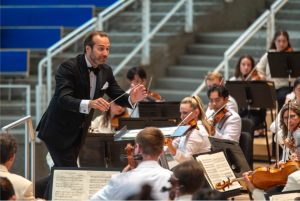Grieving: It’s a process

Courtesy photo
It has taken me nearly 19 years to completely reflect back on the passing of my father. In losing my father, I lost not only a parent but a foundation, a source of love, stability, and the patriarch of my family. At the time, I was wholly conflicted as just a few weeks prior, my son was born. Processing his death and the birth of my son left me struggling with emotions. His passing marked the end of a chapter in my life, while the birth of my son marked a new beginning. The transience of life is confounding.
It’s been an enlightening, albeit torturous, experience. Some days, when I wake up, I find it difficult to find the energy to move beyond the weight of my father’s passing. Fortunately, I have a very close family and therefore had the opportunity to share my grief with others that truly understood. Not everybody is so fortunate.
Grief isn’t a moment. It is a journey — a winding, uncertain road we never asked to walk, yet one that shapes us in ways we could never imagine. Learning how to deal with grief doesn’t mean forgetting. It means learning how to carry love in a new way. It’s about making space in our hearts for the absence, learning to live alongside it instead of trying to erase it. It’s choosing to remember, even when remembering hurts.
It all seemed so lonely. Even though I had brothers, a mother, and a stepmother that shared in the loss of my father, I felt a hollow that wouldn’t pass with the distraction of time or even the birth of my son. He wasn’t just my father. Rather, he was a friend, an advisor, a confidante. He was the person I went to when I couldn’t see the forest through the trees. He was the person I expected to be there when I needed advice and guidance on being a father. I kinda felt alone — it was somewhat unnerving.
Grief can be lonely. It can also trigger unexpected waves of emotions. Sometimes, it causes people to withdraw. And, sometimes, grief may cause people to feel that they need to escape via drugs, alcohol, exercise, or keeping busy. It’s all so unchartered.
No one really teaches us how to grieve. Although there are books and checklists developed by psychologists and psychotherapists, in my opinion, they seem to fall short of truly assisting with what it feels like to lose someone we love.
While waves of emotions often swept over me, I can’t say that I ever felt withdrawn or lonely. Quite the contrary, I had plenty of people around me not only to offer support, but to listen. The problem was, I didn’t know where to start.
One night, my buddy Nate came over. When I opened the front door, I immediately assumed I knew why he had come. He had lost his father a few years prior and I guessed he thought he’d commiserate with me. While I did the obligatory, “Good to see you, thanks for coming over,” I was not really in the frame of mind to be offered advice or empathy.
Oddly enough, Nate just came in and watched some television with me. About an hour into his stay, he got up and made a couple of gin and tonics. We sat and talked for a while until my son started to cry in the next room. Nate looked over at me and said, “I got it, you look tired. You mind if I go get him?”
When Nate came back with my son and sat down, I asked, in my own sarcastic way, if he was going to offer me any advice for managing my father’s passing. Over the weeks since my father’s passing, I often heard condolences, thoughts and prayers, and comments like, “I hope it gets better; it just takes time.” I was a little taken back when he responded that he figured I’d talk when I felt comfortable. He offered no advice nor suggestions of how to fix the situation.
A week or so later, I called Nate and got together for a bike ride so we could casually talk. During our ride, he asked me if I had ever reached out to a friend of mine that helped peopled with grieving. I don’t recall when I had spoken to him about this person, but obviously I had. My friend, Celynn, is a grief counselor with years of experience helping people.
While I knew she was the perfect person to speak with, I had my reservations. It just seemed strange to me to call upon a friend for this kind of personal help. Ultimately, I put those feelings aside and reached out to her. In retrospect, it was probably one of the best things I could have done to help myself move forward.
Celynn helped me put words to my wavering emotions and better understand and feel comfortable with my emotions. She also shared with me how being a genuine lister was important in what she does. She explained to me that too often when friends try to help, they tend to offer advice and listen, but with perhaps a bit of judgment.
My experience speaking with Celynn was great. While she helped me through a rough patch, she educated me of what I can do to help others who may be grieving. Here are some pointers I took from our meetings:
- Show up and just listen without judgment.
- Give your loved one/friend the opportunity to express their thoughts and feelings.
- Understand that there is no one way to grieve.
- Rather than ask what you can do to help, take the initiative to take on a task you know needs to be done.
- Give a warm hug.
I’m not selling a friend’s service. However, if you want someone to help guide a path to feeling yourself again, call Celynn. You never know where help may lie. I didn’t and it was right in front of me. 970-376-8248.









